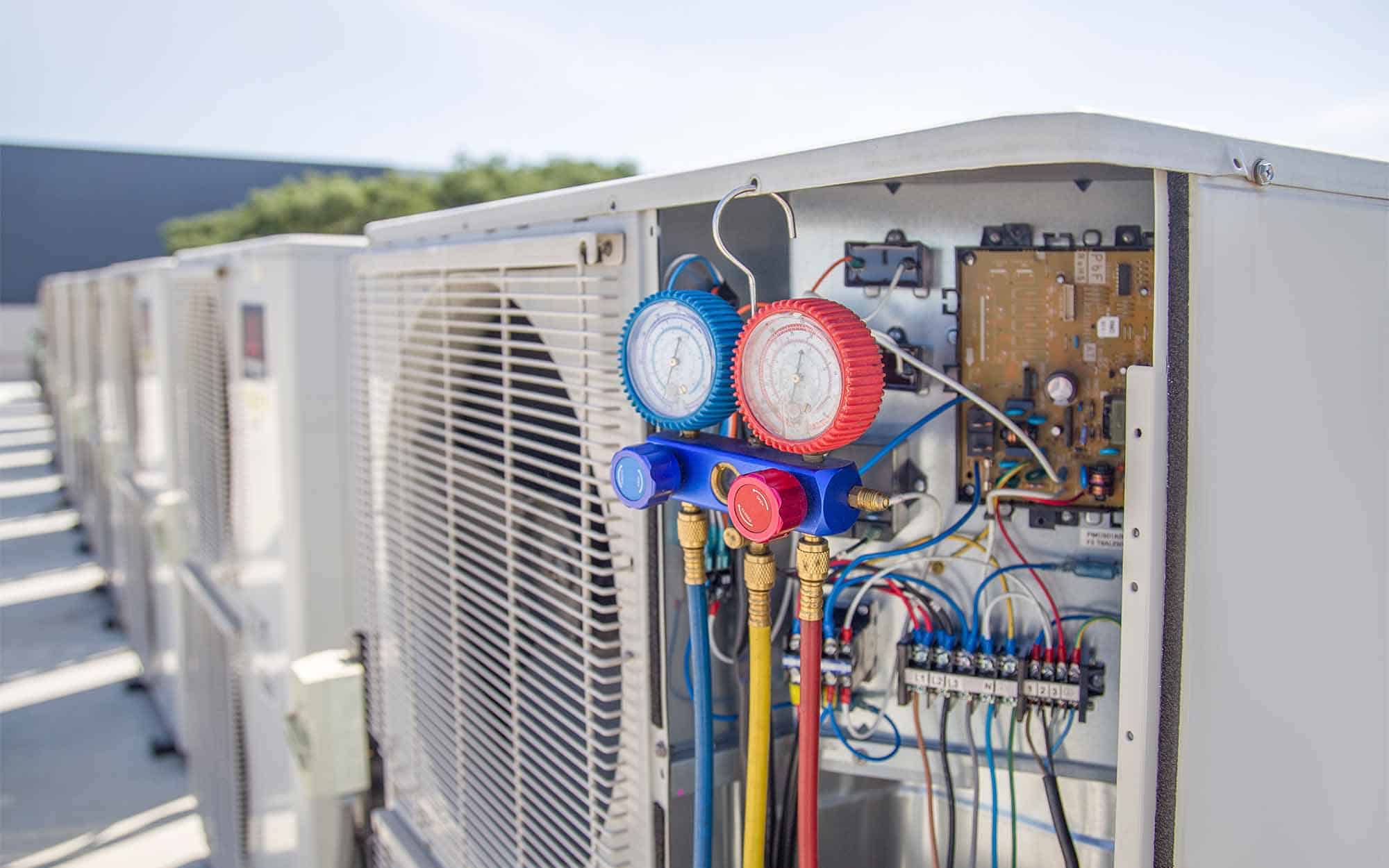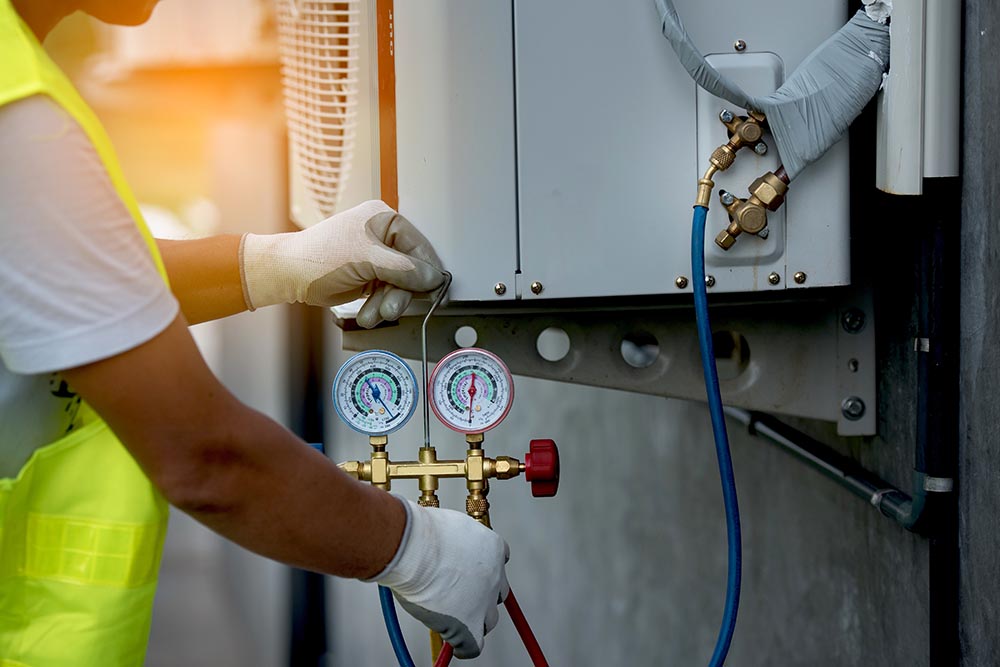Selecting In Between a Heatpump and Furnace: Secret Factors To Consider for Your Cooling And Heating Demands
When assessing home heating options for a/c needs, the choice between a heatpump and a furnace can be intricate. Each system uses unique advantages tailored to specific environments and energy performance goals. Recognizing these differences is vital for making an informed selection. Secret aspects such as setup expenses and environmental effect better make complex the option process. Which choice really lines up with one's comfort and sustainability choices? The following sections will discover these considerations carefully.
Comprehending Warmth Pumps: How They Function and Their Advantages
While several homeowners think about various heating alternatives, comprehending exactly how heat pumps function and their benefits can greatly affect their decision. Warm pumps run by moving warm as opposed to creating it. In the winter months, they remove heat from the outdoors air or ground and move it inside, while in the summer season, they reverse this procedure, cooling the home by eliminating warmth outside. This double capability makes them versatile for year-round climate control.One of the primary advantages of warmth pumps is their power performance. They utilize substantially much less electricity contrasted to typical heating unit, possibly leading to lower energy expenses (heat pump service). In addition, heatpump have a smaller carbon footprint, making them an eco pleasant option. They likewise call for less maintenance than conventional systems, adding to long-term price financial savings. In general, comprehending the mechanics and benefits of warm pumps can assist homeowners make informed decisions regarding their home heating and cooling requirements
Discovering Heating Systems: Types, Procedure, and Advantages
Heating systems come in various kinds, consisting of gas, electric, and oil versions, each with unique operational systems. Understanding these distinctions is necessary, as they affect performance and heating performance. In addition, furnaces use many advantages, such as consistent heat output and reliability in colder climates.
Sorts of Heating systems
Heating unit can vary significantly in design and procedure, with heaters being a popular selection amongst home owners. There are a number of kinds of heating systems, each using various fuel resources and technologies. Gas heating systems prevail, leveraging gas to generate heat successfully. Electric furnaces, on the other hand, use electrical resistance to create heat, usually preferred for their uncomplicated setup. Oil heaters, while less common, work in areas with limited gas gain access to (heat pump replacement ooltewah tn). Additionally, condensing furnaces maximize energy performance by capturing and reusing exhaust gases. Each type runs through a system of heat exchangers and ductwork to distribute cozy air throughout a home. Comprehending the differences in between these heating system types is essential for informed HVAC decisions
Advantages of Furnaces
For home owners looking for dependable warmth throughout chilly months, the advantages of heating systems are significant. Heating systems provide regular home heating, guaranteeing also temperature levels throughout the home. They are particularly effective in severe chilly, usually exceeding heatpump in icy conditions. Numerous types, including gas, electric, and oil heaters, provide flexibility to satisfy diverse demands and preferences.Furnaces likewise tend to have reduced preliminary installation prices contrasted to heatpump, making them a much more accessible choice for many. Their robust style adds to a much longer lifespan, with lots of units lasting over 15 years with appropriate upkeep. In addition, modern-day heating systems are typically furnished with sophisticated technology for enhanced performance, which can cause reduced power expenses. On the whole, furnaces remain a reputable selection for reliable home heating.

Power Effectiveness: Comparing Heat Pumps and Furnaces
When comparing energy effectiveness between heatpump and furnaces, the Seasonal Power Effectiveness Proportion (SEER) plays a necessary role in figuring out efficiency. Furthermore, a functional expense evaluation exposes the long-term economic ramifications of each system. Recognizing these aspects can guide homeowners in making notified decisions regarding their home heating services.
Seasonal Power Efficiency Proportion
Energy performance plays an important function in the decision-making process in between warm pumps and heating systems, specifically when thinking about the Seasonal Power Effectiveness Proportion (SEER) This statistics measures the cooling performance of heatpump over an entire air conditioning period, offering a standard method to evaluate efficiency. Higher SEER rankings show better energy performance, converting to lower energy usage and lowered energy bills. In comparison, heating systems are generally examined making use of the Yearly Gas Application Efficiency (AFUE) rating, which reflects home heating effectiveness. When comparing these 2 systems, property owners must focus on SEER rankings for heatpump, as they straight effect general power savings and ecological sustainability. An extensive understanding of SEER can notably influence the important source long-term fulfillment and cost-effectiveness of the picked cooling and heating service.
Functional Price Evaluation
Understanding the operational costs related to heatpump and heating systems is crucial for property owners reviewing their choices. Heatpump usually use greater energy performance, converting electrical energy right into heat with minimal waste. This results in lower monthly energy costs, especially in modest environments. On the other hand, typical heaters, specifically gas designs, may have lower in advance prices however can sustain higher functional costs with time because of sustain prices and efficiency ratings.Moreover, heatpump can operate as both heating and cooling systems, potentially minimizing the need for separate heating and cooling systems. While preliminary investments for heatpump might be greater, their long-term financial savings in power performance can make them a more economical selection for lots of homes. Mindful evaluation of neighborhood energy rates is important to determine the most effective choice.
Installation Expenses: What to Expect for each and every Furnace
Setup expenses for heating unit can vary considerably in between warmth pumps and heaters, affecting homeowners' choices. Heat pumps normally have greater in advance setup prices, typically varying from $3,500 to $8,000, depending on the system dimension and intricacy of setup. This includes the outside unit, indoor handling system, and essential ductwork alterations. Conversely, heating systems often tend to have reduced first prices, averaging between $2,500 and $6,000, which can be appealing for budget-conscious house owners. However, setup expenditures can increase if extensive ductwork is required.Moreover, the selection of gas type for furnaces-- all-natural gas, propane, or electric-- can additionally influence setup prices. While warm pumps offer power efficiency, their first financial investment might discourage some customers. Inevitably, assessing installment costs along with long-term savings and effectiveness will assist house owners in making educated decisions concerning their heating unit.
Climate Factors To Consider: Which System Does Better in Your Location
How do climate conditions affect the performance of furnace? The efficiency of heatpump and heating systems can differ considerably depending on the neighborhood environment. In modest environments, warmth pumps excel by effectively transferring warm from the outdoors air, making them an energy-saving choice. Nevertheless, their effectiveness decreases in exceptionally cool temperatures, where they may have a hard time to draw out sufficient heat. Conversely, heating systems, particularly gas designs, provide regular and trusted warmth no matter outside conditions, making them more effective in colder regions.In areas that experience milder winters, warm pumps can operate properly year-round, offering both cooling and heating. In contrast, regions with you could try these out harsh winter seasons typically gain from the robustness of furnaces. Eventually, comprehending the neighborhood climate is necessary when deciding between a heat pump and a heating system, as it he said directly impacts their operational efficiency and total performance.
Maintenance Demands: Long-Term Care for Warm Pumps vs. Furnaces
While both heat pumps and furnaces require normal upkeep to ensure peak efficiency, their specific demands and care regimens vary considerably. Heating systems normally need much less frequent focus, with yearly inspections sufficing to inspect for gas leaks, tidy filters, and examine total functionality. Their simpler style frequently enables straightforward repairs.In comparison, heatpump require biannual maintenance due to their double role in home heating and air conditioning. This includes cleaning coils, checking refrigerant levels, and making sure that both the exterior and interior systems operate at their best. Additionally, heatpump maintenance commonly involves even more detailed parts, making professional maintenance essential.Neglecting maintenance can cause lessened efficiency and enhanced power expenses for both systems. Eventually, homeowners should think about these long-term treatment requirements when choosing in between a warm pump and a furnace, as positive maintenance can prolong the life-span and efficiency of either system substantially.
Ecological Influence: Selecting a Sustainable Home Heating Alternative
The ecological effect of furnace is a crucial examination for homeowners looking for sustainable options. Heatpump are normally much more energy-efficient than standard heaters, as they move heat instead of generate it, substantially lowering carbon discharges. By using renewable resource sources, such as air-source or geothermal heat pumps, house owners can even more decrease their eco-friendly footprint.On the various other hand, natural gas furnaces discharge greenhouse gases and contribute to air contamination, though they frequently give greater heat outcome. Developments in technology have actually led to the growth of high-efficiency heating systems that decrease emissions.Ultimately, selecting a heating system entails considering effectiveness against environmental effect. Property owners are motivated to review regional power resources and rewards for eco-friendly systems, making sure a choice that straightens with both personal convenience and ecological obligation. The decision influences not just instant comfort but likewise long-term sustainability and environmental wellness.
Often Asked Inquiries
How Much Time Do Warm Pumps and Furnaces Commonly Last?
The lifespan of warm pumps generally varies from 15 to two decades, while heaters can last in between 15 to three decades. Routine maintenance substantially influences their long life and efficiency in offering home heating services.
Can I Use a Heatpump in Incredibly Cold Climates?
Heatpump can run in incredibly chilly environments, but their efficiency lessens as temperature levels drop. In such problems, additional heating resources may be necessary to maintain comfortable indoor temperatures and assure peak performance.

What Is the Sound Degree of Warm Pumps Versus Furnaces?
The sound levels of warmth pumps and heaters differ substantially. Usually, warmth pumps run even more quietly than typical heating systems, making them preferable for those conscious appear, while heaters may generate louder operational noises during home heating cycles.
Are Warm Pumps Suitable for Both Heating and Air conditioning?
Heatpump are indeed appropriate for both heating & cooling (ductless mini splits). They function by transferring heat, providing reliable temperature level control year-round, making them a functional choice for property owners seeking an all-in-one HVAC remedy
What Size Home Heating System Do I Required for My Home?
Identifying the appropriate size heating system for a home needs reviewing elements such as square video, insulation top quality, local environment, and the home's design. Consulting a specialist can assure an accurate assessment and optimal comfort. Warmth pumps usually use higher power effectiveness, transforming electrical power into warm with marginal waste. In moderate environments, warmth pumps excel by effectively moving warm from the outdoors air, making them an energy-saving alternative. Alternatively, furnaces, specifically gas models, supply regular and trustworthy warm regardless of outdoor problems, making them more suitable in chillier regions.In areas that experience milder winters, warm pumps can operate effectively year-round, offering both home heating and cooling. Warm pumps are typically much more energy-efficient than typical heating systems, as they transfer warm instead than produce it, substantially reducing carbon emissions. By making use of renewable energy resources, such as geothermal or air-source heat pumps, property owners can better reduce their environmental footprint.On the other hand, natural gas heating systems emit greenhouse gases and add to air contamination, though they usually supply greater warm outcome.
Comments on “Why Now is the Best Time for heat pump installation ooltewah tn”